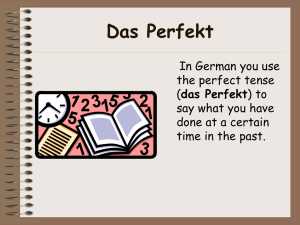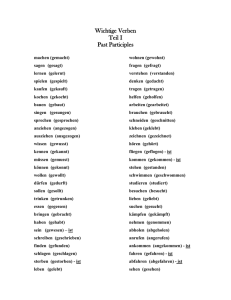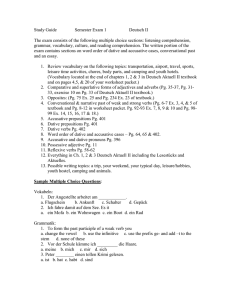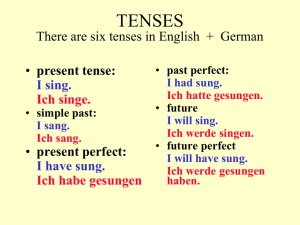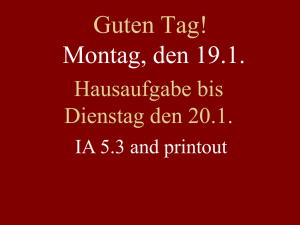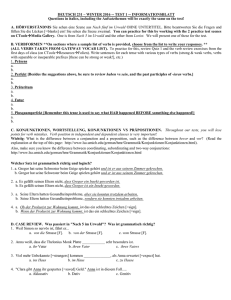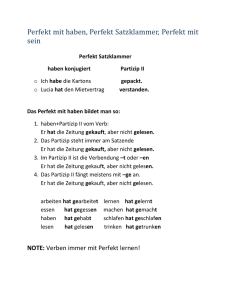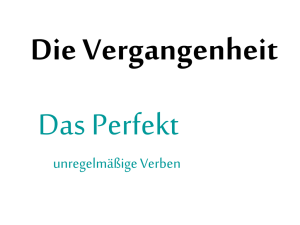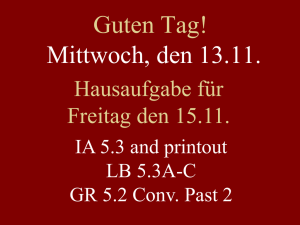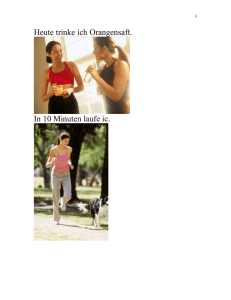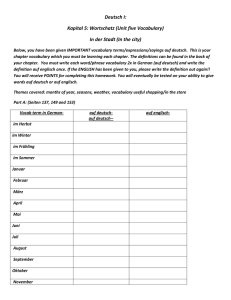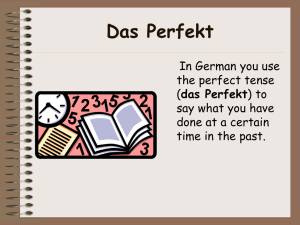Vocabulary from the trip to Aachen (y8)
Werbung
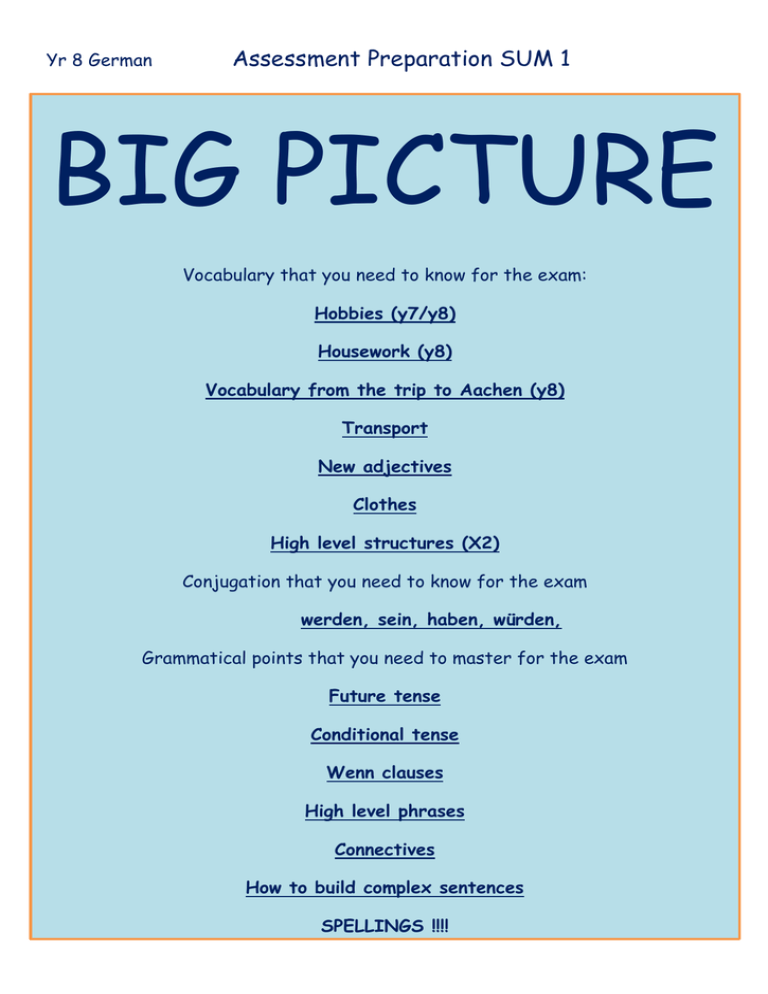
Yr 8 German Assessment Preparation SUM 1 BIG PICTURE Vocabulary that you need to know for the exam: Hobbies (y7/y8) Housework (y8) Vocabulary from the trip to Aachen (y8) Transport New adjectives Clothes High level structures (X2) Conjugation that you need to know for the exam werden, sein, haben, würden, Grammatical points that you need to master for the exam Future tense Conditional tense Wenn clauses High level phrases Connectives How to build complex sentences SPELLINGS !!!! 1. Main vocabulary Topic/ question YOU NEED TO KNOW THIS Vocabulary YOU NEED TO KNOW THIS Practice spelling here / add personal notes (difficulty, pronunciation, extra vocabulary…) Wie bist du? (What are you like?) Ich Ich Ich Ich ………………………………………………………………… heisse.... wohne.... habe..... bin..... ………………………………………………………………… ………………………………………………………………… Wie bist du gefahren ? (How did you get there?) Wie war es? (How was it?) Was hast du während deiner Ferien gegessen In den letzten Ferien bin ich ….… in the last holidays, I went by,,,.... mit dem Bus mit dem Zug mit dem Flugzeug mit dem Fahrrad mit dem Auto mit dem Taxi mit dem Schiff zu Fuß gefahren …aber ich hatte Lust auf + akk. Es war nicht nur.. It was not only,,,.... ………………………………………………………………… ………………………………………………………………… ………………………………………………………………… ………………………………………………………………… ………………………………………………………………… ………………………………………………………………… ………………………………………………………………… schön lang langweilig kurz schrecklich aufregend gefährlich sicher sondern auch war es[…..] but also it was ………………………………………………………………… Während meiner Ferien habe ich [insert food] gegessen During my holiday I ate,.... ………………………………………………………………… ………………………………………………………………… ………………………………………………………………… ………………………………………………………………… ………………………………………………………………… ………………………………………………………………… und getrunken ? Fleisch (What did you Pommes eat and drink Salat during your Gemüse holidays?) Obst Frühstücksflocken Kuchen Was hast du während deiner Ferien gegessen und getrunken und wie war es ? (What did you eat and drink during your holidays & how was it?) Was hast du während deiner Ferien getragen ? What did you wear during the holidays? Während meiner Ferien habe ich [insert drink] getrunken During my holiday I drank.... Cola Orangensaft Wasser Wein Cocktails Sekt Bier Champagner , denn es war because it was…. gut schmackhaft lecker widerlich eklig schlecht Während meiner Ferien habe ich [insert clothing] getragen During my holiday I wore,.... einen Badeanzug die Hose einen Pullover ein T-shirt die Shorts das Hemd die Jeans ein Kleid einen Rock ………………………………………………………………… ………………………………………………………………… ………………………………………………………………… ………………………………………………………………… ………………………………………………………………… ………………………………………………………………… ………………………………………………………………… ………………………………………………………………… ………………………………………………………………… ………………………………………………………………… ………………………………………………………………… ………………………………………………………………… ………………………………………………………………… ……………………………………………………………….. ………………………………………………………………… ………………………………………………………………… ………………………………………………………………… ………………………………………………………………… ………………………………………………………………… ………………………………………………………………… ………………………………………………………………… High level structures / complex opinión phrases To extend your sentences To organise your ideas Ich finde, dass.. Meine Meinung nach ist. Persönlich meinerseits meinetwegen Ich glaube, dass.. Für mich war die wichtigste Sache Was ich liebte war… Nicht nur…. sondern auch …. Ich hatte Lust [insert transport] zu fahren. , denn (does not affect the word order) , weil (kicks verb to the end of the clause) mit meinen Freunden mit meiner Familie im Park ins Kino aber Jedoch Dennoch Zuerst Dann Danach Endlich ………………………………………………………………… ………………………………………………………………… ………………………………………………………………… ………………………………………………………………… ………………………………………………………………… ………………………………………………………………… ………………………………………………………………… ………………………………………………………………… ………………………………………………………………… ………………………………………………………………… ………………………………………………………………… ………………………………………………………………… Your vocabulary : (write any other vocabulary that you think can be useful) Tips: learn vocabulary in complete sentences, not just isolated words! Tips : prepare flashcards Tips: always VARY your vocabulary 2a. Basic Conjugation (present tense) wohnen (to live) Ich wohne Du wohnst Er/sie/es wohnt Wir wohnen Ihr wohnt Sie /sie wohnen Sein (to be) Ich bin Du bist Er / Sie ist Ihr seid Wir sind Sie / sie sind Haben (to have) ich habe du hast er hat wir haben ihr habt sie; Sie haben estudian 2b. Perfect Tense Conjugation Haben (to have) ich habe du hast er hat wir haben ihr habt sie; Sie haben Sein (to be) * Ich bin Du bist Er / Sie ist Ihr seid Wir sind Sie / sie sind + past participle at the end of the clause * Only use “sein” for verbs where movement is involved from A to B. 3. Learning intentions “I can define what a subject, auxiliary and a past participle are.” SUBJECT: “I am the person or thing doing the action. I am part 1 (the top bread)” AUXILIARY: “I help to create the past tense. I can be HABEN or SEIN. I must sit next to the subject in 2nd place. I am part 2 (the actual burger).” PAST PARTICIPLE: “I am the verb usually ending with t but there are many irregularities (see below). I am part 3 (the bottom bread).“ “I can form past participles for regular and irregular verbs.” Regular verbs ge….t Irregular + HABEN essen gegessen trinken getrunken besuchen besucht Separable + HABEN aufräumen aufgeräumt abstauben abgestaubt besuchen besucht Movement verbs + SEIN gehen (to go) gegangen (on foot) ankommen (to arrive) angekommen fahren (to travel) gefahren (with transport) fliegen (to fly) geflogen schwimmen (to swim) geschwommen I can recognize and create past tense You need 2 PARTS the auxiliary (either haben or sein, depending on the type of verb) and the past participle. Ich habe Sounvenirs gekauft. Ich bin einkaufen gegangen. Tips: put a 2 and a 3 under/above your auxiliary and your past participle to make sure you did not forget one or the other. Tips: do not forget the past participle must sit at the end of the clause. How do I know if I need haben or sein? Most verbs take “haben”. Use “sein” only if there is movement from A to B (e.g. gehen – ich bin gegangen) “I can express which transport I used .” Use a sentence starter + a past tense + a transport + high level structure + a reason In den letzten Ferien bin ich mit dem Zug gefahren aber es war sehr lang. Ich hatte Lust mit dem Flugzeug zu fahren, denn es ist sicher und schnell. Tips: Use “, denn” if you do not remember that “weil” kicks the verb to the end. Tips: Use “weil” to really impress – but make sure the conjugated verb is the one at the end! Key words to help improve the quality of your sentences: aber und dann (+ inversion) jedoch (+ inversion) nicht nur....sondern auch Revision tips: KEY STRATEGY Strategy 1: Strategy 2: Strategy 3: but and then however Not only...but also... SAY IT OUT AND WRITE IT OUT + PRACTICE SPELLINGS! This is the key to all your learning! Practise writing out a sentence. Use look, cover, and check to see if you can rewrite it perfectly. Highlight mistakes and rewrite until it is correct! Put post it notes with a sentence on each in different areas of your room. When memorizing the sentence, picture the object where the post it notes are. Create flashcards – one side is a picture and on the other side is the sentence it represents. Turn them over as you learn them. Strategy 4: Reading through your book IS NOT revision.
